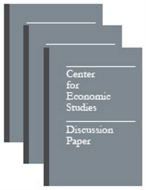Universal Preschool Lottery Admissions and Its Effects on Long-Run Earnings and Outcomes
Universal Preschool Lottery Admissions and Its Effects on Long-Run Earnings and Outcomes
Abstract
We use an admissions lottery to estimate the effect of a universal (non-means tested) preschool program on students’ long-run earnings, income, marital status, fertility and geographic mobility. We observe long-run outcomes by linking both admitted and non-admitted individuals to confidential administrative data including tax records. Funding for this preschool program comes from an Indigenous organization, which grants Indigenous students admissions preference and free tuition. We find treated children have between 5 to 6 percent higher earnings as young adults. The results are strongest for individuals from the lower half of the household income distribution in childhood. Likely mechanisms include high-quality teachers and curriculum.
Others in Series
Working Paper
Working Paper
Working Paper




